Sahiyo to release nine new Voices to End FGM/C digital stories
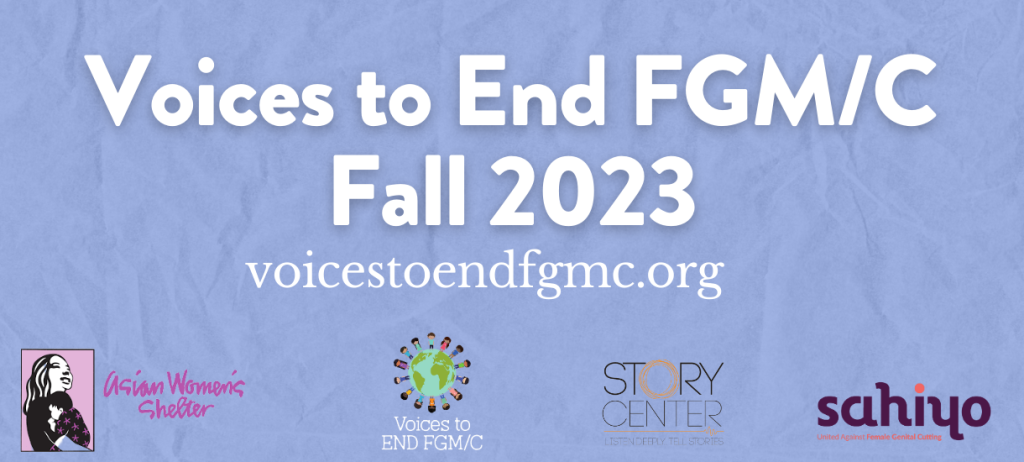
“Everything I learned from the workshop was gold to me. I enjoyed all the sessions and the new skills I acquired in creating a digital story (…) about a scar. A scar that my primary duty bearers believed was necessary to have in order to be labeled as the “purified” girl, for marriage, as opposed to being referred to as a “solimaa”, the uncut girl. A scar that will resemble a fresh wound for the rest of my life. Here I am today, after being silent for many years. I now am not afraid to talk in public about stopping FGM/C.I wish I didn’t have this scar. I wish you didn’t either. But we don’t have to be silent about it.” ~Amie Kujabi, Voices Storyteller Amie is one of nine storytellers who participated in the latest cohort of the Voices to End FGM/C project. Each participant bravely created videos sharing their experiences with female genital mutilation/cutting (FGM/C), with the ultimate goal of ending this harmful practice. And starting on January 17th, Sahiyo will begin sharing these short videos along with reflection blogs from each storyteller. A collaboration between Sahiyo, StoryCenter, and Asian Women’s Shelter (AWS), every year the Voices to End FGM/C project brings together survivors, activists, and others impacted by FGM/C from around the world. Together, these storytellers heal by connecting and sharing their stories, while growing as leaders. So far, we’ve held seven workshops in the past six years, supporting over 70 courageous souls from more than 19 countries to share their experiences. Along with being therapeutic, these stories are tools we use to plant the seeds of greater social change. Through watching these videos, we’ve educated governments about the need for policies that protect future generations of girls from FGM/C. The videos also teach healthcare professionals and other service providers about the impact of this practice, so they can better help survivors. “I just hope people that receive this message understand how wrong this is and if there’s anyone who’s in my shoes who’s lost a friend this way or someone they loved, that way they can get up and advocate and they can start speaking against this practice. I hope when they receive this message, they realize the danger.” ~Gugu Makhari, Voices Storyteller We’ll be updating the blog with the videos and reflection blogs from this year’s cohort when they’re available very soon. In the meantime, you can support storytellers from past cohorts by watching their videos on this playlist. For further questions, contact Aries at aries@sahiyo.org.
Musuya (Womanhood)
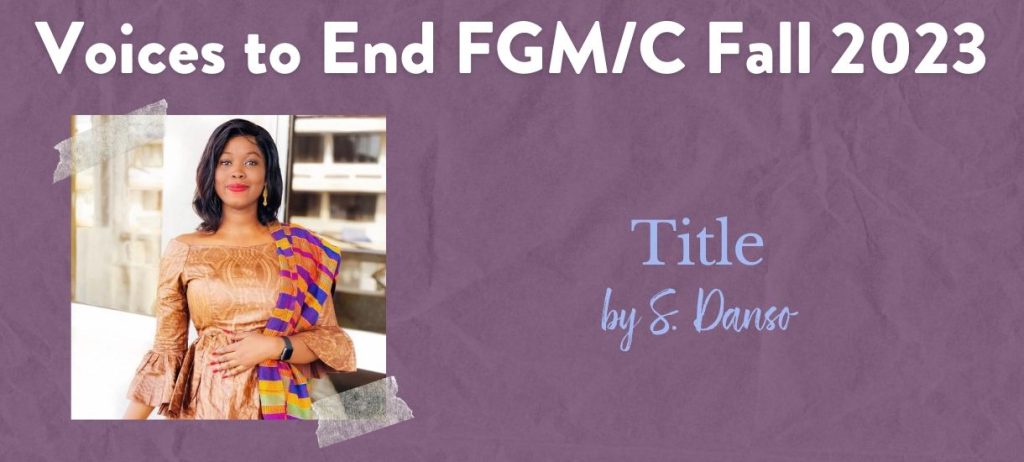
“I believe they don’t really know what it is and how it is conducted, the procedures, and the negative impact that it has… It will be easy to say ‘don’t ban FGM’ when you don’t know what happened in there.” In S Danso’s country, men are working in Parliament to repeal the ban on female genital mutilation (FGM). However, S feels that her story of undergoing FGM and its impact will make those who wish to perform FGM on their loved ones reconsider. She felt it was important to be a part of the growing number of voices raised against FGM, and the Voices to End FGM/C digital storytelling workshop provided an opportunity to do so on an international level. When asked why she wanted to attend the workshop and share her story of FGM, S’s answer was clear: raising awareness. She chose to tell the story of her experience undergoing the cut, with exact details of the ceremony and circumcision that are not well known. “If you are educating people, it is important to get right to the point.” The Voices to End FGM/C workshop was also impactful to S in multiple ways, as she learned from the other participants, who came from different parts of the world. In particular, other survivors talked about how to deal with the “post-FGM whatsoever.” “Things happen and you don’t know how to deal with it,” S explains of her experience as a survivor. However, people at the workshop “explained their healing process” as well as “how to do advocacy work and better convey [a] message to the people.” “Hearing their stories… has motivated me to come up and give out my story. I feel so empowered and confident hearing all of their stories.” S’s workshop experience represents that there is power in numbers, and in creating safe spaces where survivors can come together to share, to heal, and to advocate for change. [youtube url=”https://www.youtube.com/watch?v=iTN6j2JINnE”] S Danso is a Gambian National and a legal practitioner with over eight years of experience in community work and activism focusing on equality, inclusion and social justice. Currently, she is the secretary-general of One African Women’s Forum, an international organization that focuses on promoting women’s rights based in Nigeria. Sirra has impressed all with her warmth, wisdom, and kindness, but above all, her intellectual curiosity and a keen interest in social justice and equality remain exceptional.
It’s a Marathon, Not a Race
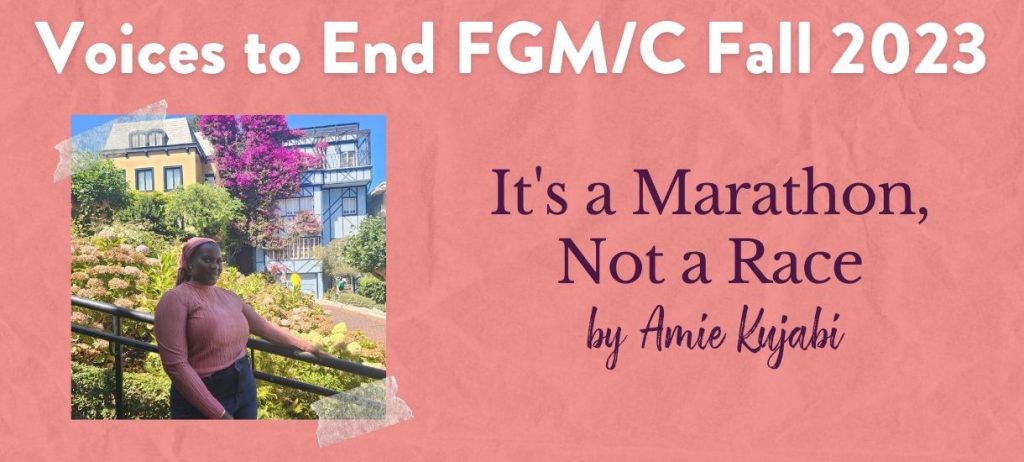
By Amie Kujabi I am an FGM/C survivor. For the past two decades, my advocacy on FGM/C has been centered around other survivors and girls at risk—but never have I shared my story. A story that shaped the trajectory of my childhood and marked the beginning of a long…long…lonely self-awareness journey to an unknown destination. I took a bold step and shared my story as an FGM/C survivor with people outside of my close-knit circle by giving testimony during an anti-FGM/C bill hearing with policymakers in Washington State. It occurred to me that there is a need for survivors to share their unique stories to raise awareness and encourage action-oriented commitments from different stakeholders. When the opportunity to participate in the digital storytelling workshop presented itself, I challenged myself to be part of the amplified voices. Voices that not only narrate similar stories about FGM/C but also give a human face to FGM/C. In our digital world, people are moved not just by words, but also by actions and visual representation. Since FGM/C is not seldom talked about—a taboo in our communities—it was important for my story to be told in a captivating way, to change the narrative. My digital story narrates the experiences I remember the most as a six-year-old girl who was taken to another country (Senegal) for FGM/C, under the disguise of spending summer break with my cousins and family. And so it happened: I was cut and introduced into “womanhood,” as they claimed. I later understood it as “vocational cutting” at the peak of my self-awareness journey as an adult and advocate. My story highlights the issues I faced—and I continue to struggle with. As a survivor, I struggled a lot, with my relationships growing up and in adulthood. Though this experience took me on an unknown journey, it landed me on the shores of “fighting for what is right”. That’s what propelled me into my work as a girl’s and women’s rights advocate. Everything I learned from the workshop was gold to me. I enjoyed all the sessions and the new skills I acquired in creating a digital story. From learning how to write a straight-to-the-point short story, creating and editing a digital story, being in a space with other survivors and allies, sharing our stories, and most importantly, finding support in each other. It made me feel seen and understood in my multifaceted emotions and struggles that the rest of the world may never see on a day-to-day basis. The workshop was an amazing experience, and I want more women (and others ) to be part of this great network. Together we can create more digital stories that amplify voices against this horrendous practice. I want my story to captivate the attention of people from different walks of life. I hope that it will inspire survivors to share their stories, allies to render their support when and where it is needed, and even those on the other side of the table to finally resist this age-old tradition that harms girls. My hope is to see every state and nation have solid anti-FGM/C policies in place. I know for a fact that these laws concentrate on protecting girls at risk of being subjected to FGM/C, but I hope to see the implementation of policies that would support survivors of FGM/C as well. I hope you will find the time to watch my short digital story. A story about a scar. A scar that my primary duty bearers believed was necessary to have in order to be labeled as the “purified” girl, for marriage, as opposed to being referred to as a “solimaa”, the uncut girl. A scar that will resemble a fresh wound for the rest of my life. Here I am today, after being silent for many years. I now am not afraid to talk in public about stopping FGM/C. If there had been laws when I was a child, things would have been different. I was able to convince another family member to have her girls cut. And my mother is finally on board with me. But all I can think is that I failed you. I wish I didn’t have this scar. I wish you didn’t either. But we don’t have to be silent about it. [youtube url=”https://www.youtube.com/watch?v=Kfp7DQXzjlk”] Amie Kujabi was born and raised in The Gambia, a small country in West Africa. She is very passionate about development issues, especially from a grassroots level, but also, about what development should entail at a global scale. Amie is a human rights advocate, as well as a champion for women and girls’ rights and empowerment. She is also the co-founder of Think Young Women, a young women-led organization in The Gambia. Amie is an FGM/C survivor and anti-FGM/C advocate currently residing in Washington State. As a member of the Washington Coalition to End FGM/C, Amie helped Washington become the 41st state to enact anti-FGM/C legislation. Amie is also a recent graduate of Global Development Studies and French and Francophone Studies and aspires to contribute immensely to the development of her community, state, and at the international level.
Turning Grief into Purpose
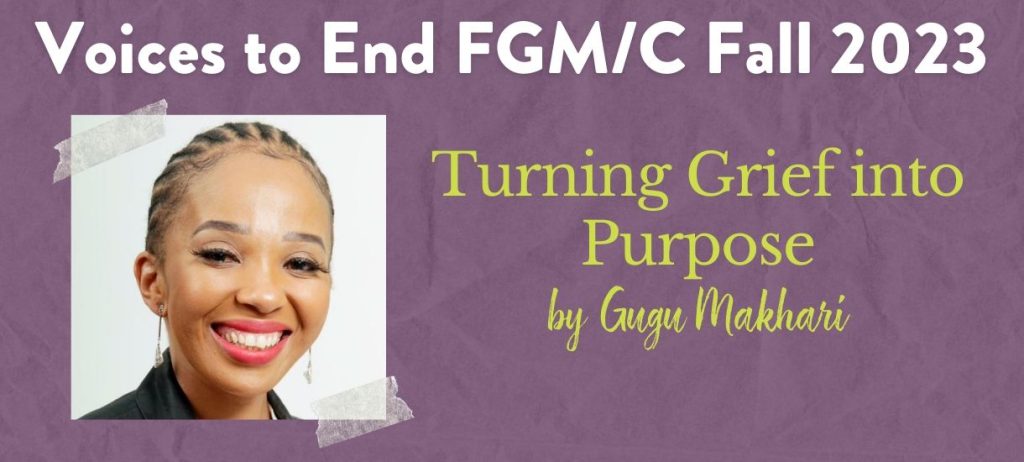
Gugu Makhari learned about the Voices to End FGM/C digital storytelling project through a friend and through personal research online. She wanted to share a story about how both female genital cutting (FGC) and male circumcision are normalized in her community. Those who undergo these harmful practices are often celebrated after they are cut. “After a couple of months they come back and then we have this big ceremony where everyone comes out from different neighborhoods all together and they will go in a group and sing along cheer for them, so we’re so used to that.” But, this tradition had a painful impact on Gugu. She knew one girl who underwent FGC and never spoke to her again; and another friend who underwent male circumcision and died from the practice. These experiences affected her for life, and she still feels the loss of her close friend for the sake of tradition. “I lost a friend and I always wanted to express myself… but I didn’t know how and I didn’t really have a platform to do that.” The Voices workshop allowed her to have the space to tell her story for the first time. Gugu described her friend who died as: “The only person I had at the time when I was going through a lot at home, that understood me and who was really supportive and really loved me genuinely. He was very close to me. So yeah, that hurts.” Learning about her friend’s death was difficult for Gugu, as their relationship was something she cherished deeply. “When I found out about his death. I went to his home and his mom [told] me what happened, but she didn’t tell me in detail. I was still a little young, in our culture…you accept what you are told and that’s usually it. I’m not gonna be asking his mom why you let this happen.” The unknown circumstances of her friend’s death frustrated Gugu, not knowing what happened, and why a practice with fatal consequences occurred in her community. This is what inspired her to create a story in his memory. For her digital story, Gugu created art pieces that reflected the fun and joy that radiated from her friend. “I was expressing myself using the art… it helps in so many ways. It was… a kind of healing, I don’t know how to say it. But it also helped because it opened another door for me to really now use art as a form of expression for human rights. The art was about the culture where he came from. I have some drums that I drew in different sizes so that it resembles being heard amplifying your voice louder and louder and louder” The Voices workshop provided her a cathartic space to tell her story, and to learn the stories of others who had undergone harmful practices like FGC. “I’ve learned a lot about being confident and I learned a lot about sharing your story, how it can change other people’s lives. I’ve been to so many workshops and events, but I didn’t even feel like I was necessarily at a workshop. It felt like I was with family. And I couldn’t believe that people have gone through so much pain. Hearing other people’s stories made me realize that there’s more for us to fight for in the world. And even if I was not directly affected, it helped for me to be there as well as a voice.” Gugu’s choice to share her story about her friend highlights how connections can be made between the movement to end FGC and other harmful practices justified by tradition. “I just hope people that receive this message understand how wrong this is and if there’s anyone who’s in my shoes who’s lost a friend this way or someone they loved, that way they can get up and advocate and they can start speaking against this practice. I hope when they receive this message, they realize the danger.” [youtube url=”https://www.youtube.com/watch?v=YlO7asmsWxA”] Gugulethu ‘Gugu’ Makhari is a dynamic force dedicated to championing women’s rights, human rights, and youth empowerment on a global scale. As the Chair of the Commission on Women’s Rights and Human Rights, she serves as a passionate advocate for change through her active involvement with the Youth Council for Global Sustainable Development Goals Inc NGO. Her commitment to creating a better world extends beyond borders, as she has also taken up the role of USA National Organizer and Coordinator for the “March For Our Planet” movement, catalyzing action for environmental sustainability. Gugu’s multifaceted expertise and unwavering dedication make her an inspiring force driving positive change in diverse spheres.
Resilience
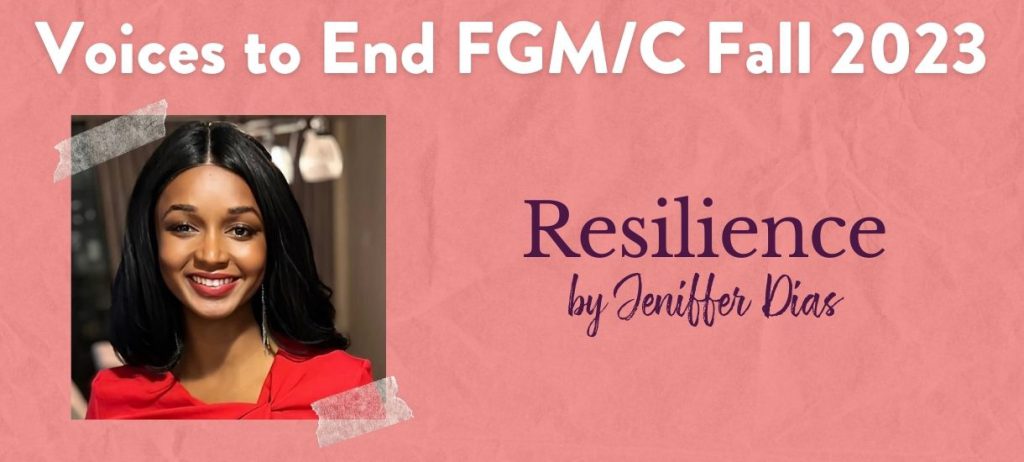
By Jeniffer Dias When I learned I had an opportunity to participate in the Voices to End FGM/C workshop, I first talked with my mentor, Bárbara Oliveira, and told her that I would like to talk about myself. She told me: “This is the moment to remove your ‘mask’ and talk about you, about who you are, and how strong you have been with being alone all your life. And how you protected yourself from being afraid, from being rejected, or from people trying to do what your father did to you. You are far away from that and free.” So I decided to talk; talk about what I did, and still do to protect myself from my past. And I decided to talk about my resilience, and how it has pushed me in my studies, work, and everyday life, to not let others hurt me again. As I usually say, resilience is the ability to accept that life has four seasons, and no matter how difficult and cold winter is, it will end. And then the spring comes, which makes me forget all the suffering that the cold caused me. Then I start to contemplate the flowers, the green fields, the birds chirping, and the rebirth of life. For me, resilience is my inner strength, my faith, the engine that exists within me that does not allow me to stop or remain shaken for a long time in the face of complicated situations; in the eyes of others, it would be impossible for me to find a way to survive or get out of it. The decision to talk wasn’t easy, however. Hours before the first virtual meeting, I was so nervous. I did a lot of things to distract myself because my mind just didn’t want to accept having to talk about my terrible past. I was also worried because the last time I opened up to people about myself, they started treating me differently. So when I started talking I was afraid, but when the meeting finished I felt at peace with myself. I learned a lot during my workshop experience, especially about how powerful women can be stronger together. I also learned that, in working together, our voices can have an impact, improving and changing others’ lives. I felt welcomed and part of the group; everybody treated me very well. I felt love, peace, at home, and all these things helped me to create my story. I am proud of my ability to use the bad things that I had to live with during my childhood (psychological, emotional aggression, humiliation, and abandonment), and transform them into love, affection, and care for others. Creating my story was like officially removing any relationship from being afraid of being rejected. It was like a shout of freedom. I would like my story to have a positive impact. I want my story to inspire others to share the message that everything is possible when you believe in yourself. Regardless of what others say or do to stop your dreams, you can accomplish them. My goals are to be an ambassador at the United Nations, and to work with children’s rights, to protect them against physical and emotional violence. I also want to have a family, to travel, and to be happy. I believe I can accomplish these goals with determination and Resilience. [youtube url=”https://www.youtube.com/watch?v=DPZFTU9Lzto”] Jeniffer Dias, is Portuguese born in Guinea-Bissau. Jeniffer graduated from Universidade Nova de Lisboa, where she studied Political Science and International Relations. She has a strong comprehensive view of diplomacy, international relations, and human rights. Currently, she is carrying out research for her Master’s degree in International Relations with a focus on Child Marriage.
A Personal Journey: Breaking the Silence on FGM
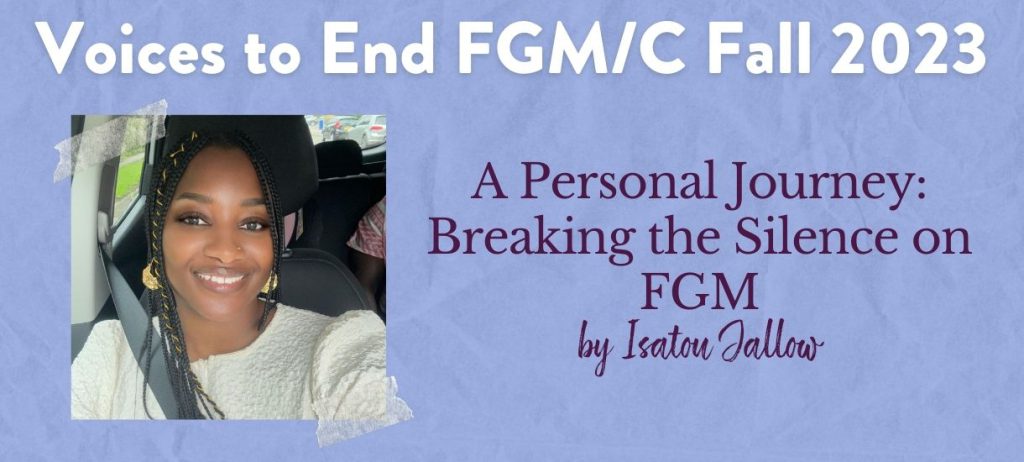
By Isatou Jallow In my film “Behind The Wall,” I’ve chosen to share my deeply personal experience with Type 3 Female Genital Mutilation (FGM). Through this storytelling, my aim is threefold. First, I want to educate. FGM, deeply rooted in tradition, often goes unquestioned. By unveiling the raw pain and suffering I endured, I hope to provoke reflection within communities about the necessity and ethics of this practice. Secondly, it serves as a testament to resilience. By sharing my story, I aim to show survivors that they are not alone and that healing is possible. It’s my hope that this personal account can offer solace and encouragement to those who have experienced similar pain. Lastly, this documentary is a call to action. By shedding light on FGM, we can mobilize governments, NGOs, and communities to work together to eradicate this harmful practice. In sharing my story, I hope to create a world where girls are free from this brutality, where silence is replaced with compassion, and where stories like mine inspire change. Together, we can amplify the voices of survivors and put an end to FGM. [youtube url=”https://www.youtube.com/watch?v=Nnf6zYEzjv4″] Isatou Jallow is a legal scholar in the final year of her Ph.D. program at the University of Washington School of Law. With a strong commitment to advocacy and community service, she has volunteered and interned at organizations like Northwest Immigrants Rights and YWCA Sexual Violence Legal Services. Isatou also served as a commissioner for the City of Seattle Immigrant and Refugee Services, fostering inclusion and understanding among diverse communities. She gained valuable experience in the HR department of Seattle Children’s Hospital, focusing on accommodation and worker’s compensation. Driven by a belief in diversity and inclusion, Isatou founded Inclusive Outlook, a nonprofit advocating for inclusive education for children with disabilities and the health rights of women with disabilities. She is also the founder of Amosa Skin, a brand donating most of its proceeds to support Inclusive Outlook’s initiatives. As Isatou approaches the final year of her Ph.D. program, she is focused on defending her research and completing her doctoral studies, aiming to contribute to research, policy development, and community engagement to promote inclusivity and make a positive impact.
Breaking the Cycle: A Journey in Women’s Health and FGM/C Awareness
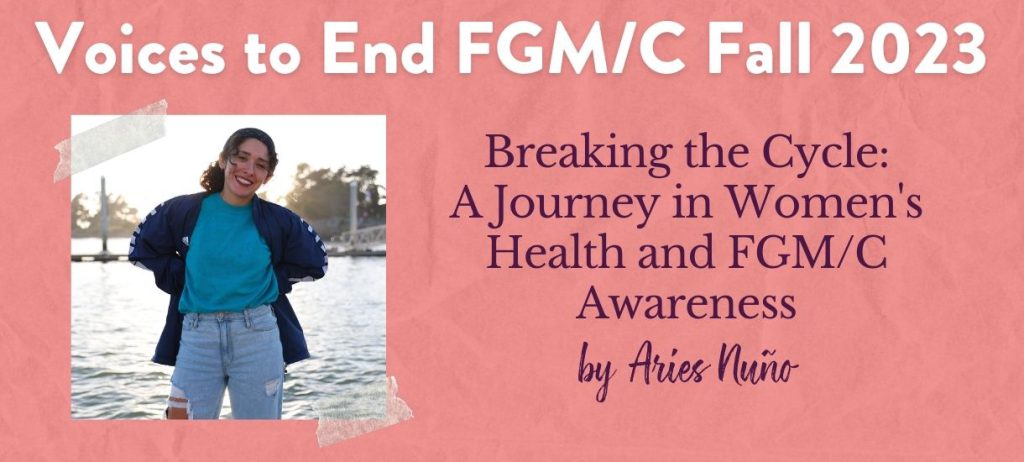
By Aries Nuño In participating in Sahiyo’s Voices to End FGM/C digital storytelling workshop, I chose to share a story that examined my journey toward understanding women’s health. This journey was not just a personal quest, but a response to a disquieting cultural reality: the pervasive silence among generations of women about their own bodies. Such silence, I discovered, often culminates in uncomfortable encounters within healthcare settings. My narrative serves as both a reflection and a critique of this phenomenon, extending its scope to spotlight the unique challenges faced by those who have undergone FGM/C when interacting with healthcare systems. I hope my story serves as an eye-opener for healthcare professionals and the general public. Healthcare providers should strive for empathy and cultural sensitivity, as well as an understanding of how negative interactions in a healthcare setting can exacerbate an already traumatic experience for survivors of FGM/C. For the public, I would like my narrative to be both an invitation to engage in an open dialogue about women’s health and an encouragement for conversations across generations — from grandmothers to mothers to daughters. By weaving these elements of storytelling together, I aim to not only bring individual experiences into a larger discussion, but also to contribute to a more nuanced, empathetic, and effective approach to public health. In doing so, I hope to be a part of breaking the cycle of silence and to help initiate lasting social change, one story at a time. [youtube url=”https://www.youtube.com/watch?v=QQbNhFlw4L8″] Aries Nuño is a public health professional interested in the sociocultural influences on an individual’s experience with sexual and reproductive healthcare. In her diverse public health career, she has contributed to projects including human-centered design to address female genital mutilation/cutting (FGM/C) in Ebonyi, Nigeria, and expanding web-based access to self-administered STI and HIV testing for Indigenous populations across the U.S. She began volunteering with Sahiyo in 2021, and now joins the team as the Training and Technical Assistance Coordinator. She looks forward to leveraging her public health background to facilitate educational opportunities to promote more sustainable approaches to end FGM/C.
Bearing Tradition: Navigating the Pressure of Khatna
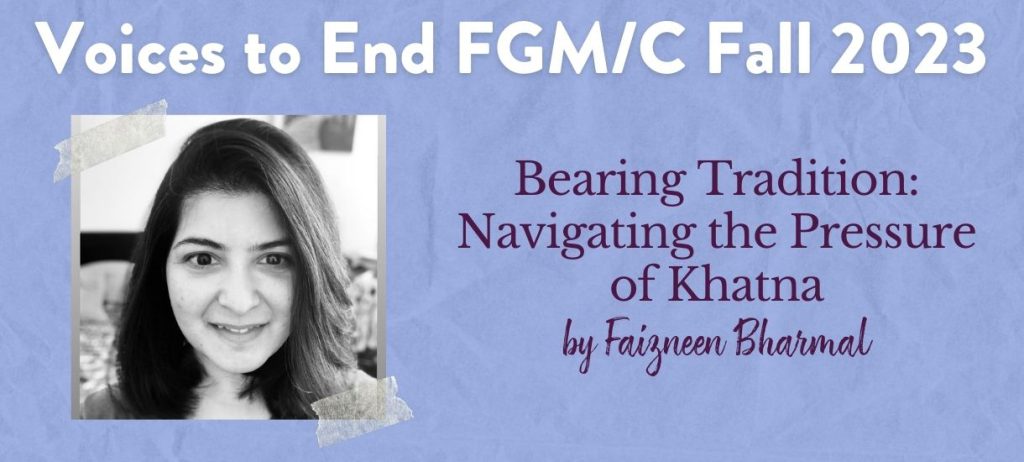
By Faizneen Bharmal Growing up in a progressive and well-educated Dawoodi Bohra family, the topic of Khatna, commonly known as female genital mutilation/cutting (FGM/C) around the world, was always shrouded in silence. The subject was rarely broached unless one became a parent, at which point it became relevant. For the majority of my life, I remained oblivious to its existence. Within the Dawoodi Bohra community, FGM/C Type 1 is predominantly practiced. In the majority of cases, this involves part of the prepuce or the clitoral hood being cut. I’ve often heard rationalizations for the practice, from women in my community: “We only remove a tiny, inconsequential part. Most girls hardly even notice it.” “It’s done under the supervision of a medical practitioner, ensuring hygiene and safety.” However, my story and experience prompts me to pose some critical questions to those who persist in this harmful practice. Does the severity of trauma a child endures become acceptable just because it involves removing a tiny part? A child who can remember when the act was performed on them? Are you so resolute in your beliefs that you’re willing to deprive your child of what they rightfully deserve? Does your religious duty and the societal pressure of community membership outweigh the lifelong trauma that a child must endure? For far too long, Khatna, as it’s referred to in the Bohra community, remained a closely guarded secret—a taboo subject that was never up for discussion. What perplexes me is that it contradicts everything I know about my community: A community that prides itself on being educated, forward-thinking, and modern. My story isn’t merely about the personal trauma I endured, but also about the immense pressure the community exerts on each generation to uphold this tradition. A tradition, it seems, is a beast that’s not easily slain, even if it causes them to sacrifice the well-being of young girls. When I made the decision to share my story, I engaged in a profound conversation with my mother. I’m grateful that she understood my perspective and is willing to support me in my mission to educate women of her generation and those younger so that the burden of this practice is not passed down to their daughters and daughters-in-law. [youtube url=”https://www.youtube.com/watch?v=a8rNekCvjc4″] Faizneen is a communications professional with 12+ years of experience working to inspire action and meaningful engagement via content creation, storytelling, and media in humanitarian crises situations, rural transformation, public health, human rights, women’s rights, literacy, and poverty alleviation.
You mean it’s not supposed to hurt when I pee?

Why did you want to attend the workshop and share your story? I wanted to attend this workshop because I wanted to get a sense of the process of storytelling from a survivor’s and advocate’s perspective. I am keeping in my heart hundreds of stories that survivors from my community have shared with me. What story did you choose to tell and create into a digital story? I chose to tell the story of medical complications caused by FGM/C and the cry for help from hundreds of women who shared their stories with me. What have you learned or most enjoyed during the workshop and by meeting others who shared their stories? The camaraderie and the shared lived experiences cannot be replicated. It was a once-in-a-lifetime experience that was divinely orchestrated with the right mix of participants present. What kind of impact would you like your story to have? I hope that my story will be a clarion call for folks to help me bring to light the need for medical care for hundreds of thousands of women who need help locally, nationally, and globally. Is there anything in your digital story that you would like to share? My digital story connects trauma, healing, and resilience to drawing strength from our ancestors. Our healing journey is incomplete without acknowledging their pain and their untold stories. [youtube url=”https://www.youtube.com/watch?v=IVlRd4yz9Yg”] Doris Mukangu, MPH, is the Founder and Executive Director of the Amani Women Center, a comprehensive culturally tailored community center that provides comprehensive services that empower and contribute to the economic security and well-being of refugee and immigrant women and their families. As a graduate of Emory University, Rollins School of Public Health, and Harvard Kennedy School of Non-Profit Management, Mukangu has over eighteen years of experience serving in leadership roles with non-profit organizations on refugee affairs and health promotion and education. Mukangu has served as a technical expert on programs initiating and implementing culturally appropriate, trauma-informed equitable methods of training, program planning, evaluation, and dissemination. With a strong commitment to prompting wellbeing, advocacy, and empowerment to the most vulnerable populations, Mukangu founded Johari Africa; a women’s economic empowerment program, served as vice president of the board of Tapestri Inc, ending violence and oppression in refugee and immigrant communities, and serves on the steering committee of US End FGM/C Network https://endfgmnetwork.org/.
I Didn’t Dare Ask
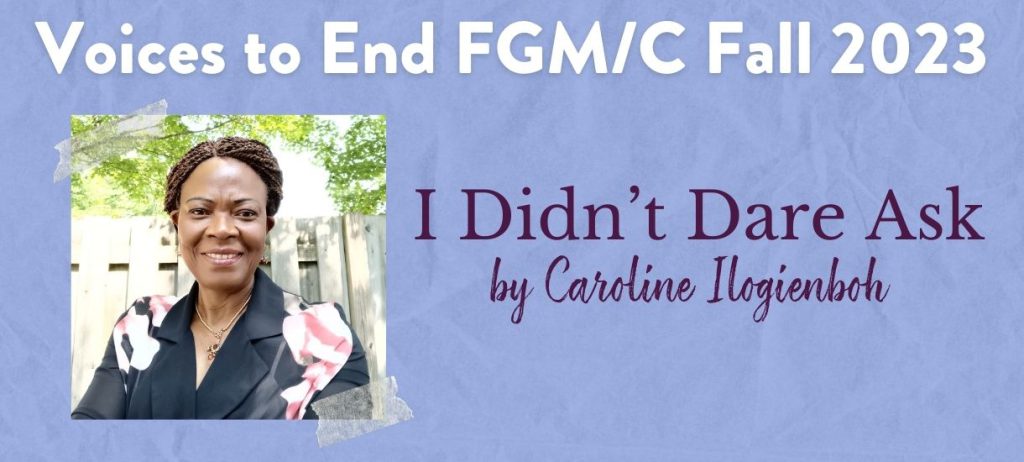
Why did you want to attend the workshop and share your story? I attended the workshop to learn about digital storytelling as another medium of communication in my advocacy work to stop female genital mutilation/cutting (FGM/C). What story did you choose to tell and create into a digital story? I shared the story of the unintended consequences of my cut. After the procedure, I was victimized in school. My peers mocked, despised, and isolated me; I was a loner thereafter. I lost my essence in an age when most youth are filled with exploratory exuberance. What have you learned or most enjoyed during the workshop and by meeting others who shared their stories? Hearing stories from others was an eye-opener. At the workshop, I became more aware that FGM/C can be like secondhand smoking: the procedure can affect those who themselves did not undergo the surgery. I found out that the ripple effect can be as devastating as the cut. Meeting others at the workshop made me feel a kinship with those affected directly or indirectly. Our experiences left us with a long-lasting bond. What kind of impact would you like your story to have? When one part of the body suffers, the whole body suffers. I want people to know that FGM/C can damage an individual’s self-worth, which can become the root cause of other behavioral or mental health issues. Is there anything in your digital story that you would like to share? The story is a plea to practicing communities, to convince them that the cost of the practice, imposed on the society, far outweighs the traditional beliefs driving it. It is my hope that silence will be broken, and people will be motivated to engage in an intellectual conversation that could demystify this traditional belief, with an aim to abolish it. [youtube url=”https://www.youtube.com/watch?v=TbmLtZ6ep6g”] Pidgin version: [youtube url=”https://youtu.be/MG5ZwPGoVFw?si=3IPaMuclLNxcAPP8″] Nigerian-born Caroline Ilogienboh retired from the Justice System in New Jersey, USA. She has written several books. Her award-winning book, “Saving Bekyah” is focused on female circumcision and its effects on women and society. The sequel, “The Greatest Hijack,” is on the Author’s Favorite list. She is currently working on the last of the trilogy, “The Hijacker Strikes Back.” When she’s not writing, Caroline spends time gardening or with her grandchildren.
